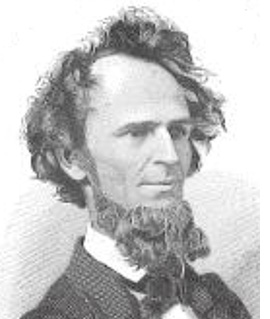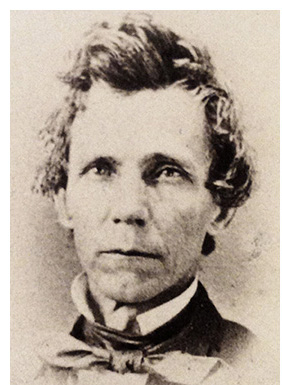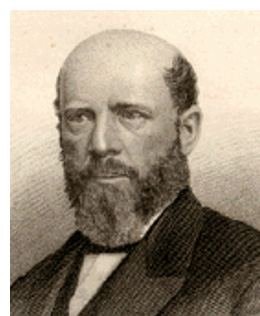The is the conclusion of an article that appeared in the Oct. 9, 1909, issue of Christian Standard simply titled, “In Memoriam,” but with the subtitle (in all-caps), “ADDRESS AT THE GRAVES OF KENTUCKY VETERANS.“ It was the text from an address by J. W. McGarvey at The Lexington Cemetery on Sept. 24 of that year. He spoke about eight pioneer preachers buried in the cemetery. Last week in Part 1, he offered recollections of John T. Johnson, “Raccoon” John Smith, Thomas Smith, and R. C. Ricketts.
_ _ _
ADDRESS (continued)

I am now to speak of men who are remembered by the majority of my hearers. Robert Milligan was pre-eminently a college man. As a professor, he taught in the several colleges he was connected with, the whole round of college courses; but his supreme delight was in teaching the Bible, and his influence for good over the minds and hearts of students was unequaled. Wherever he labored—in Washington College, Pa., in Bloomington, Ind., in Bethany College, in Kentucky University, or in the College of the Bible—his personal influence was the power which did most in molding the characters of young men. There has been only one other man, in comparison with whom I have been in doubt as to which was the more godly, and he was Thomas Campbell. In a brief speech which I made at the funeral of Sister Milligan a few months ago, I said that she had been for thirty-three years the wife of the best man who ever lived or died in Lexington; and I think that no one who knew him well can call that estimate in question. He was so devoted to his work that I have known him, during the extreme feebleness of his later years, to conduct his classes when he was not strong enough to sit upright, but was compelled to lean upon his desk. It was my mournful privilege to be at his bedside when he breathed his last, and to deliver before a crowded and weeping audience in the old Broadway Church the funeral discourse. Most reverently do I commend his life to the imitation of all young men.

Dr. L. L. Pinkerton was a later contemporary of all whom I have thus far mentioned. He was a man of superior literary taste and culture, and thus, together with a warm temperament, made him a very popular preacher. He was for some years professor of English literature in Kentucky University, but his most memorable work was in connection with the church and the orphan school at Midway. He was one of the founders of the orphan school, and he always took a deep interest in its welfare. On a certain court day in Garrard County, Ky., some persons who had charge of a small orphan girl were trying to dispose of her, somewhat as a slave girl was auctioned off to the highest bidder. The Doctor said, “Give her to me.” They were glad to do it. He brought her to the orphan school, where she grew up with a good education, became a handsome and agreeable young woman and a successful teacher in the public schools. She was often a welcome visitor in my family. Such a man was Dr. Pinkerton.
Moses E. Lard comes next on my list. He was a man of powerful frame and impressive appearance. As a writer he was master of a style seldom equaled, and some of his essays, published in Lard’s Quarterly were equal in literary merit to the finest productions of Washington Irving. As a speaker, when at his best, he was the most eloquent I have ever heard. His descriptive powers were unsurpassed, and he often stirred the depths of our souls till our hearts would almost burst. He had one peculiarity as a preacher which I have not observed in any other. When he once prepared a sermon that pleased him, he continued to work on it and repeat it until he brought it up to his ideal. He never prepared to his own satisfaction, I think, more than twelve or fifteen sermons, and these he did not hesitate to repeat again and again before the same hearers. I remember that once he announced a subject in our old Main Street Church with the statement, “I have already delivered four times in this house the sermon I am about to give you, but if it has taken me twenty years to prepare it, I don’t think any of you can learn all that is in it by hearing it only five times.” I watched the audience as he proceeded and they listened with as close attention and as deep interest as if they were hearing it for the first time.*
[*The speaker’s memory was at fault in naming Bro. Lard as one of the veterans buried in the Lexington Cemetery. His remains were taken to Missouri, where he spent the chief part of his life, and buried there.]

Next, and last, I speak of Robert Graham. I was more intimately associated with him than with any of those thus far mentioned. I felt highly honored by the remark which he made more than once, “John and I are like Damon and Pythias.” He was a lifelong teacher, having been a college professor for more than fifty years. As a preacher he was not so brilliant as some I have mentioned, but he was always instructive, and his discourses were systematic. The two traits of character which most distinguished him were generosity and honesty. As an instance of the former: When he was called to the professorship of English literature at Kentucky University, he was preaching for the struggling church in San Francisco. After buying tickets for his family for the journey to Kentucky, which was then by way of the Isthmus of Panama, he gave to the church which he was serving the last dollar which he possessed—$500 in gold—and landed in Kentucky with a wife and three or four children and an empty purse.
I remember a striking example of his scrupulous honesty. When our most uncivil war broke out, he was living at Fayetteville, Ark., where he had built up a flourishing college. In the turmoil with which the conflict began, his college and his private dwelling were both burned to the ground, and he was stripped of all earthly possessions. He was under the necessity of moving to some peaceful community out of the range of border warfare, but he had no money and no property on the credit of which he could borrow money. But he had a reputation which was better than goods or lands. Generous friends loaned him without security all that he wanted. When the war had ended, and he was at the head of Hamilton College with a good salary, the time came to prepare for paying his debts. The Government paper, then known as “greenbacks,” had been made by Congress a “legal tender,” good for the payment of all debts, though it was then worth only eighty cents on the dollar. Thousands of businessmen took advantage of this law, and his friends in Arkansas proposed to settle with him for greenbacks at par; but he rejected their generous offer, and said that he would not take up his notes till he could make payment in money worth one hundred cents to the dollar. This he did.
Notwithstanding this generosity, Bro. Graham was a business man of extreme care and promptness. He once told me that when at his desk in reach of his memorandum books, he could account for every five cents that had passed through his hands in the last twenty years.
I have now completed my list, and have kept you standing long enough: but there are many others buried here, both old and young, both male and female, who made themselves useful in the church, and whose names are in the book of life. This is the most beautiful cemetery that I have ever seen, though I have traveled much, and I know of no other in which lie buried the remains of so many saints. There are brethren present who will lead those of you who are strangers, to these highly honored graves. Visit them, not to shed a tear over them, but to rejoice and thank God that you have fellowship with those who sleep in their embrace.
_ _ _
Two years later, on Oct. 6, 1911, John William McGarvey died. He, too, is buried in The Lexington Cemetery . . . not far from the Henry Clay Monument and John Smith’s grave.
Here is a link to McGarvey’s page at findagrave.com.
Learn more about how Milligan University came to be named for Robert Milligan at that school’s website.
Learn more about the origins of Midway University, which grew out of the Kentucky Female Orphan School, which Dr. L. L. Pinkerton was integral in founding, at www.midway.edu.

0 Comments